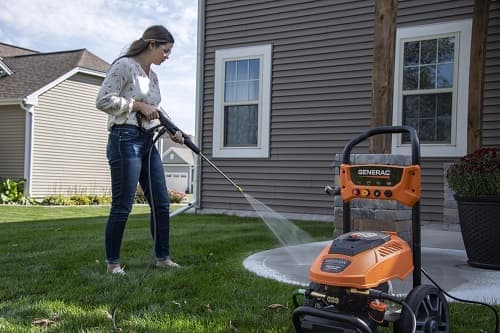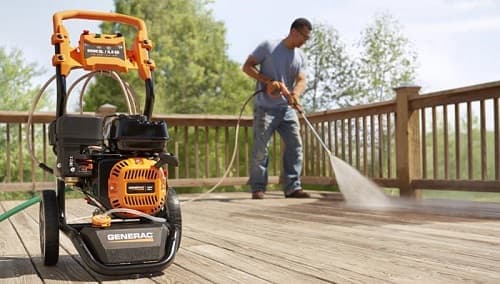Pressure washers are excellent tools for cleaning a variety of surfaces, from vehicles to concrete and brick to wood and vinyl. But, when choosing a pressure washer, one of the main considerations is whether you want an electric or gas-powered model. While both have their place, depending on your cleaning needs, there are several differences between the two that should be considered.
In this blog post, we break down the pros and cons of electric vs. gas pressure washers, so you can decide which one is best for your needs. We’ll look at features such as portability, power, and cost, as well as how they can be used in different applications. This way, you can make an informed decision on the right pressure washer to choose for your cleaning job.
Electric Pressure Washer and Gas Pressure Washer- An Overview
Electric Pressure Washer

An electric pressure washer is a device that uses a combination of high-pressure water and electricity to clean dirt and debris from surfaces. It comes with an electric motor powered by an AC outlet or battery that drives the pump creating the cleaning pressure.
It is an invaluable tool for those who are looking to perform a thorough and efficient cleaning job, and it has been gaining traction as an effective and cost-efficient way to clean.
The electric pressure washer can be used for a variety of applications, from light-duty cleaning jobs around the home to more heavy-duty commercial jobs. Its convenience, sustainability, and cost-effectiveness make it a great choice for any cleaning job.
Check for the Best Electric Pressure Washers
Gas Pressure Washer

Gas Pressure Washers are powered by small gas engines to drive the pump. They are a powerful and effective way to clean a variety of surfaces. From removing dirt and grime to eliminating oil and grease build-up, the efficacy of a gas pressure washer is undeniable.
Gas pressure washers are mainly used in industrial and commercial settings, but residential users can also benefit from their use. These units use a pressurized stream of water to blast dirt, grime, and other buildup off of surfaces. It makes them an ideal choice for cleaning driveways, patio furniture, machinery, vehicles, and more.
Check for the Best Gas Pressure Washers
Note: Compared to electric models, Gas pressure washers are better for large jobs, such as heavy-duty cleaning, stripping paint, and commercial buildings. Additionally, they have a higher PSI than electric versions, making them easier to clean tougher surfaces faster.
Electric Vs. Gas Pressure Washers- Comparison Points
1. Water Pressure
The Water Pressure of the pressure washer is measured in PSI (Pounds Per Square Inch). The higher the PSI of the model, the greater the pressure it will deliver.
The PSI range of electric pressure washers is from 800-1800 PSI. This makes them best for lighter jobs like cleaning cars, decks, patios, etc. On the downside, these electric pressure washers are not as powerful as gas-powered units.
Gas Pressure Washers have the PSI range from 2500-4000, which is typically more than electric ones. This PSI range makes them ideal for tackling heavy-duty cleaning jobs like stripping paints, building sites, concrete, etc. But make sure not to use them on delicate surfaces as they can damage them due to their higher PSI.
Related: Safe PSI for Car Washing
2. Water Flow Rate
The water flow rate of the pressure washers is measured in GPM (Gallons Per Minute). GPM refers to the flow rate or volume of water that comes out from the pressure washer nozzle. The higher the GPM of the pressure washer, the quicker it can wash a surface.
Most of the household electric pressure washers deliver the water flow rate ranging from 1.5 to 2.5 GPM. On the other hand, the gas pressure washers deliver 2.5 to 4.0 GPM. They also have powerful engines, heavy-duty pumps, and brass parts, allowing them to tackle large amounts of water. This shows that these units are more powerful and can quickly clean larger surface areas than the electric-powered units.
3. Portability and Maneuverability
Electric pressure washers are lighter machines making them easily portable from one place to another. But since they rely on power outlets for operation, it limits their mobility as you need to search for the electric sockets, or you may need the extension cord.
On the other hand, Gas pressure washers are heavier than electric models. But since they rely on fuel for their operation instead of using the power source, you can use them anywhere.
4. Ease of Use
Starting and using an electric pressure washer is too easy, which requires just plugging in a power outlet and switching it on for the operation. You just need a convenient power outlet for ease of usage. You can also increase their range using an extension cord, but sometimes the lack of a power source limits their mobility.
Another plus point of electric pressure washers is that they don’t emit any toxic and invisible fumes like the gas-powered units; thus, they are safe to use indoors.
Talking about the gas pressure washers, they require a pull start which is quite difficult. Even they need to be topped up with fuel to start. On the positive side, they can easily go anywhere as you don’t need to search for the power outlets here and there. This makes them the best choice for outdoor cleaning.
But, the worst part with the gas-powered units is that they produce carbon monoxide and emit invisible and toxic fumes, which makes them unsafe to use indoors.
5. Maintenance
Electric pressure washers require minimal maintenance, including time-to-time lubrication for the pump and general cleaning, etc. On the other hand, gas pressure washers require more maintenance over the electric-powered units. Their motor requires frequent maintenance. Both oil and gasoline filters need to be changed annually, and the spark plug needs frequent replacement.
6. Noise
In general, gas-powered pressure washers tend to be louder than electric ones. The noise level of an electric power washer is usually about 80 decibels (dB), similar to most household vacuum cleaners. On the other hand, the gas pressure washers generate more noise and can reach over 100 dB.
It is because gas engines produce more noise than electric motors. Even the combustion process that powers a gas engine generates a significant amount of noise, whereas an electric motor operates more quietly. Additionally, gas-powered pressure washers often have higher pressure ratings and flow rates than electric models, which can also contribute to their increased noise level.
Overall, if noise is a concern for you, an electric pressure washer may be a better option.
7. Price
In general, the gas-powered pressure washers tend to be more expensive than electric ones due to the cost of the gas engine and other components. Furthermore, gas engines require more regular maintenance and fuel to run, which adds to the cost.
In contrast, electric pressure washers have a simpler, more compact design that uses an electric motor instead of a gas engine. This makes them less expensive and easier to operate, making them more affordable for many people.
Finally, gas-powered pressure washers typically require regular maintenance and may need to be serviced more often than electric models, which can add to their overall cost.
A good quality electric pressure washer ranges from $150 to $800. On the other hand, gas-powered pressure washers cost between $200 and $2000.
Electric Vs. Gas Pressure Washers- Pros and Cons
Electric Pressure Washer Pros
- Electric Pressure Washers are light in weight and easy to maneuver.
- They are best for home use, including cleaning cars, decks, patios, sidings, etc.
- They are eco-friendly over the gas models, as there are no fuel or gasoline emissions that can cause environmental pollution. This also makes them ideal to use in enclosed spaces.
- They are quiet in operation.
- Electric pressure washers require less maintenance.
- These versions are electric-powered, so you don’t have to worry about running out of fuel. Simply plug in a power outlet and turn the machine on.
- The Electric pressure washers are more affordable than the gas versions.
Electric Pressure Washer Cons
- Electric Pressure washers have less PSI than the gas models; therefore, they are not ideal for heavy-duty cleaning jobs.
- You need a power outlet for the operation, which is a limitation. Also, if you’re using the cord extension, you can only use the machine as far as the cord allows.
Gas Pressure Washer Pros
- They have a higher PSI range making them suitable for heavy-duty cleaning jobs for household and commercial usage.
- Their water flow rate is also higher as compared to the electric models, so you can clean large areas quicker and faster.
- Designed with heavy-duty parts, gas pressure washers are dependable and durable.
- Though they are heavier than electric versions, their sturdy frames with wheels allow easy portability. You can even use them anywhere outdoors as you don’t need to search for power outlets.
Gas Pressure Washer Cons
- Gas Pressure Washers are noisy.
- They require regular maintenance.
- They are more expensive than the electric pressure washers. Furthermore, you need fuel or oil to run them, which adds extra cost to their operation.
- You can’t use them in enclosed spaces as they emit carbon monoxide, which is toxic and harmful.
Bottom Line
So, which one is the Best? Well, there is no definitive answer to which type of pressure washer is “better” because the best option will depend on your specific needs and preferences.
Gas-powered pressure washers are more powerful and have higher flow rates than electric ones, so they may be a good choice for heavy-duty cleaning tasks. However, they are typically louder and more expensive to purchase and operate than electric pressure washers.
On the other hand, electric pressure washers are typically quieter and less expensive, but they may have less power or flow rate than a gas-powered model.
Ultimately, the best option for you will depend on the type of cleaning you need to do, your budget, and other factors.
Read Next: Are Pressure Washers Good For Cleaning Cars?